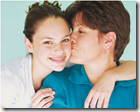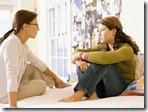 Research has showed that by the age of 8, peers influence children more than parents. This is true for what they like, how they dress and the activities they engage in. However, parents still maintain a significant role in teaching their child how to manage their emotions well beyond the age of 8. This is why, parents are crucial in helping to reduce childhood/teenage anxiety.
Research has showed that by the age of 8, peers influence children more than parents. This is true for what they like, how they dress and the activities they engage in. However, parents still maintain a significant role in teaching their child how to manage their emotions well beyond the age of 8. This is why, parents are crucial in helping to reduce childhood/teenage anxiety.
Here are some tips on how to help your child or teen cope with their anxiety in a more healthy manner.
1. Provide structure and warmth– Parents who achieve a balance between predictable boundaries and compassion are much less likely to have teens and children who experience anxiety. Maintain a similar schedule every day and be sure both parents are on the same page with regards to unacceptable behavior and consequences. Children and teens require predictability and without that, will show signs of anxiety.
2. Encourage healthy behaviors – Children and teens who are prone to anxiety are sensitive to their daily routine. Encourage them to eat healthy food, have regular bed times and exercise regularly to help reduce the anxiety. (For tips on ingredients that lower anxiety, visit our Food & Mood section.)
 3. Listen to their feelings – South Asian parents can have a tendency to dismiss children’s negative feelings, falsely believing that children and teens have nothing to feel bad about. Often saying things like, “You have everything, why are you still upset?” or “Wait until you’re an adult then you’ll know real stress” are all ways to invalidate your child’s experience and your child or teen will no longer feel comfortable talking to you about their life. Listen to what they say no matter how trivial it may seem to you and show empathy for what they are going through.
3. Listen to their feelings – South Asian parents can have a tendency to dismiss children’s negative feelings, falsely believing that children and teens have nothing to feel bad about. Often saying things like, “You have everything, why are you still upset?” or “Wait until you’re an adult then you’ll know real stress” are all ways to invalidate your child’s experience and your child or teen will no longer feel comfortable talking to you about their life. Listen to what they say no matter how trivial it may seem to you and show empathy for what they are going through.
4. Help them relax – Teach your child that life is about balance and that while anxieties exist even as adults, that a healthy person knows how to balance the two. Teach them when to know to take a break from a frustrating situation. Spend some time each night doing something relaxing. Deep breathing, counting to 10 slowly or muscle relaxation are all simple ways to reduce anxiety.
5. Challenge negative thinking – Anxious children and teens often assume the worst before it has even happened. Encourage them to replace negative thoughts with positive ones so they learn how to believe in themselves and the situation. This should help shift the cycle of negativity to one of positivity.
6. Be a positive role model – Most anxious children become anxious by watching their parents react to challenges with anxiety and fear. Monitor your own anxiety levels and model calmness when handling a difficult situation or solving a problem. Sometimes talking out loud can help a child or teenager understand how you are conceptualizing the problem. If they hear you talking about it in a constructive way, they will start to absorb that way of thinking as well.
7. Know when to get help – Not all childhood or teenage anxiety can be addressed at home by the parent. If the symptoms seem to be getting worse or are interfering with the child or teen’s day to day activities, the help of a pediatrician or a mental health professional may be necessary. Early intervention is key to a healthy development.
We would love to know your thoughts on this article. Please leave your comments below.
